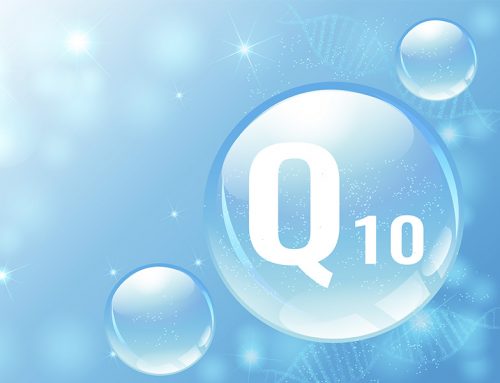In the Mechanisms of Ageing and Development journal, Professor Jan Aaseth, Professor Urban Alehagen, and I have published a review of the research literature relating to Coenzyme Q10 and aging. Here, I want to summarize the main points briefly.

Dr. Jan Alexander is MD, PhD, ERT, and Professor at the Norwegian Institute of Public Health in Oslo. He is the co-author, together with Professor Urban Alehagen and Professor Jan Aaseth, of many articles about Coenzyme Q10 and selenium. (ERT stands for Eurotox Registered Toxicologist.)
What is CoQ10 and Why is it Important?
Coenzyme Q10 is a substance with vitamin-like effects on our health; however, our cells can synthesize Coenzyme Q10, so, by definition, it is not a vitamin. Among its important health-promoting effects are the following:
- an essential component in the process of ATP energy generation
- an important fat-soluble antioxidant in cellular membranes and lipoproteins
- an anti-inflammatory agent
What Causes Sub-Optimal CoQ10 Levels?
Once we have passed our 20s, our cells’ ability to synthesize Coenzyme Q10 declines and decreases steadily with increasing age [Kalén 1989]. It is reasonable to think that most individuals in middle age and in their senior years might benefit from a CoQ10 supplement.
In addition to age, genetic failure and drug interference can diminish CoQ10 reserves. Especially well-known for their inhibition of CoQ10 bio-synthesis are the statin medications used to reduce the bio-synthesis of cholesterol. Both cholesterol and Coenzyme Q10 are produced in the same biological pathway; efforts to inhibit cholesterol production have the same effect on CoQ10 production in the cells [Okuyama 2015].
How does Coenzyme Q10 Reduce Mitochondrial Dysfunction and Protect Mitochondria?
The place where an adequate supply of Coenzyme Q10 is important in the aging process is in the mitochondria. The mitochondria are the bean-shaped organelles in the cells that use oxygen to convert food to ATP energy.
Coenzyme Q10 is a crucial component in the mitochondrial electron transport chain that generates ATP energy. In the process of energy generation, the mitochondria produce waste products that are known as reactive oxygen species (also known, popularly, as free radicals). These free radicals when under control do also have some beneficial effects, e.g. cell signaling functions.
An excess of free radicals, however, can have harmful effects. Harmful free radicals cause damage to DNA, both cellular DNA and mitochondrial DNA. DNA mutations caused by oxidative damage contribute to the aging process.
Coenzyme Q10 in its reduced form, ubiquinol, plays an important role as antioxidant, neutralizing harmful free radicals in lipid structures such as cellular membranes and in circulating lipids. Oxidized circulating lipids may accelerate atherosclerosis.
What are the Clinical Effects of CoQ10 Supplementation?
Cardiovascular diseases
In the Q-Symbio Study, two years of adjuvant treatment of chronic heart failure patients with Coenzyme Q10 (3 x 100 mg/day in divided doses) demonstrated a reduction in the patients’ symptoms and survival as compared to placebo [Mortensen 2014; Mortensen 2019].
In the Kisel-10 Study, four years of supplementation of community living senior citizens with Coenzyme Q10 (2 x 100 mg/day) and selenium (2 x 100 mcg as selenized yeast) were associated with a significant reduction in deaths from heart disease both during the four-year treatment period and during an extended follow-up period of 12 years, compared with study participants who took matching placebos during the intervention period [Alehagen and Aaseth 2015; Alehagen et al. 2018b].
The Coenzyme Q10 and selenium combination reduced the blood levels of bio-markers for oxidative stress, inflammation, fibrosis, glycosylated plasma proteins, and D-dimer, all of which represent risk factors for heart disease [Alehagen 2018a; Alehagen 2018b; Alehagen 2020a; Alehagen 2020b; Alehagen 2021].
Low-grade Systemic Inflammation
Two meta-analyses of clinical studies have shown that supplementation with Coenzyme Q10, as compared to placebo, is associated with significant reductions in the blood concentrations of bio-markers for inflammation [Fan 2017; Zhai 2017].
Neurodegenerative diseases
Several factors make it likely that CoQ10 supplementation can protect mitochondrial function in Parkinson’s disease patients:
- Screening of patients with Parkinson’s disease has shown lower levels of Coenzyme Q10 and higher levels of lipoprotein oxidation in the plasma, the cerebrospinal fluid, and the cortex region of the brain compared with non-affected individuals [Buhmann et al. 2004; Hargreaves et al. 2008].
- Deficiencies in circulating Coenzyme Q10 have been seen more frequently in Parkinson’s disease patients than in controls [Mischley et al. 2012].
- Clinical trials enrolling Parkinson’s disease patients have shown that CoQ10 supplementation delays the functional decline [Shults 2003].
- CoQ10 treatment in randomized, double-blind, placebo-controlled studies of 452 Parkinson’s disease patients at an early stage or at mid-stage has been associated with improvements in daily activities [Liu et al. 2011].
At present, there is no evidence in the scientific literature to show that CoQ10 supplementation can delay the progression of Huntington’s disease [McGarry et al. 2017] or Alzheimer’s disease [Galasko et al. 2012].
One explanation may be that there is poor transport of Coenzyme Q10 molecules across the blood-brain barrier [Wainwright 2018; Wainwright et al. 2020].
In the case of autistic spectrum disorders, Crane et al. [2014] have proposed a role for Coenzyme Q10. Treating autism spectrum disorders with a combination of Coenzyme Q10 and B-vitamins has been associated with some improvements in the patients [Rossignol and Frye 2012].
Researchers have also found that treatment with Coenzyme Q10 confers protection against the progression of oxidative damage and mitochondrial dysfunction in Down syndrome patients [Tiano and Busciglio 2011].
Bottom Line: Coenzyme Q10 and the Aging Process
- Reduced biosynthesis of Coenzyme Q10, which occurs with increasing age in the adult years, adversely affects crucial vascular and cerebral functions of the human body.
- Many patients with type 2 diabetes, heart disease, atherosclerosis, or neurodegenerative disorders have sub-optimal levels of Coenzyme Q10 in their blood circulation.
- Combining ubiquinone CoQ10 with selenium, particularly for individuals with low selenium intakes and status, or with the water-soluble antioxidant vitamin C, seems to optimize the antioxidant and anti-inflammatory effects of the Coenzyme Q10.
- Coenzyme Q10’s protective effect against disorders characterized by oxidative stress and inflammation is a major reason for daily supplementation with a well-formulated CoQ10 supplement. The ubiquinone form of the supplement is the most stable, most researched form [Mantle & Dybring 2020].
- Not all CoQ10 supplements are equally well formulated and absorbed [Lopez-Lluch 2019], and Coenzyme Q10’s penetration into mitochondria is unclear. The CoQ10 product used in the Q-Symbio and KiSel-10 studies mentioned above has a proven bioavailability when measured in blood. Further studies with bio-available Q10 supplements are needed.
- Coenzyme Q10 is safe and well-tolerated with only very rare minor side effects. It has a known safe upper limit of 1200 mg for long-term use [Hathcock 2008].
Read our key article about CoQ10 and cardiovascular health in elderly people
Sources
Alehagen U, Aaseth J. Selenium and coenzyme Q10 interrelationship in cardiovascular diseases–A clinician’s point of view. J Trace Elem Med Biol. 2015;31:157-62.
Alehagen U, Aaseth J, Alexander J, Svensson E, Johansson P, Larsson A. Less fibrosis in elderly subjects supplemented with selenium and coenzyme Q10-A mechanism behind reduced cardiovascular mortality? Biofactors. 2018a Mar;44(2):137-147.
Alehagen, U., Aaseth, J., Alexander, J., & Johansson, P. Still reduced cardiovascular mortality 12 years after supplementation with selenium and coenzyme Q10 for four years: A validation of previous 10-year follow-up results of a prospective randomized double-blind placebo-controlled trial in elderly. Plos One. 2018b;13(4),e0193120.
Alehagen U, Aaseth J, Alexander J, Johansson P, Larsson A. Supplemental selenium and coenzyme Q10 reduce glycation along with cardiovascular mortality in an elderly population with low selenium status – A four-year, prospective, randomised, double-blind placebo-controlled trial. J Trace Elem Med Biol. 2020a May 4;61:126541.
Alehagen U, Alexander J, Aaseth J, Larsson A, Lindahl TL. Significant decrease of von Willebrand factor and plasminogen activator inhibitor-1 by providing supplementation with selenium and coenzyme Q10 to an elderly population with a low selenium status. Eur J Nutr. 2020b Dec;59(8):3581-3590.
Alehagen U, Aaseth J, Lindahl TL, Larsson A, Alexander J. Dietary Supplementation with Selenium and Coenzyme Q10 Prevents Increase in Plasma D-Dimer While Lowering Cardiovascular Mortality in an Elderly Swedish Population. Nutrients. 2021 Apr 17;13(4):1344.
Buhmann C, Arlt S, Kontush A, Möller-Bertram T, Sperber S, Oechsner M, Stuerenburg HJ, Beisiegel U. Plasma and CSF markers of oxidative stress are increased in Parkinson’s disease and influenced by antiparkinsonian medication. Neurobiol Dis. 2004 Feb;15(1):160-70.
Crane, F. L., Low, H., Sun, I., Navas, P., and Gvozdjakova, A. (2014). Plasma membrane coenzyme Q: evidence for a role in autism. Biologics 8, 199–205.
Fan L, Feng Y, Chen GC, Qin LQ, Fu CL, Chen LH. Effects of coenzyme Q10 supplementation on inflammatory markers: A systematic review and meta-analysis of randomized controlled trials. Pharmacol Res. 2017 May;119:128-136.
Galasko DR, Peskind E, Clark CM, Quinn JF, Ringman JM, Jicha GA, Cotman C, Cottrell B, Montine TJ, Thomas RG, Aisen P; Alzheimer’s Disease Cooperative Study. Antioxidants for Alzheimer disease: a randomized clinical trial with cerebrospinal fluid biomarker measures. Arch Neurol. 2012 Jul;69(7):836-41.
Hargreaves IP, Lane A, Sleiman PM. The coenzyme Q10 status of the brain regions of Parkinson’s disease patients. Neurosci Lett. 2008 Dec 5;447(1):17-9.
Hathcock, J. N., and Shao, A. (2006). Risk assessment for coenzyme Q10 (Ubiquinone). Regul. Toxicol. Pharmacol. 45, 282–288.
Kalén A, Appelkvist EL, Dallner G. Age-related changes in the lipid compositions of rat and human tissues. Lipids. 1989 Jul;24(7):579-84.
Liu J, Wang L, Zhan SY, Xia Y. Coenzyme Q10 for Parkinson’s disease. Cochrane Database Syst Rev. 2011 Dec 7;(12):CD008150.
López-Lluch G, Del Pozo-Cruz J, Sánchez-Cuesta A, Cortés-Rodríguez AB, Navas P. Bioavailability of coenzyme Q10 supplements depends on carrier lipids and solubilization. Nutrition. 2019 Jan;57:133-140.
Mantle D, Dybring A. Bioavailability of Coenzyme Q10: An Overview of the Absorption Process and Subsequent Metabolism. Antioxidants (Basel). 2020;9(5):386. Published 2020 May 5. doi:10.3390/antiox9050386.
McGarry A, McDermott M, Kieburtz K, de Blieck EA, Beal F, et al. A randomized, double-blind, placebo-controlled trial of coenzyme Q10 in Huntington disease. Neurology. 2017 Jan 10;88(2):152-159.
Mischley LK, Allen J, Bradley R. Coenzyme Q10 deficiency in patients with Parkinson’s disease. J Neurol Sci. 2012 Jul 15;318(1-2):72-5.
Mortensen SA, Rosenfeldt F, Kumar A, Dolliner P, Filipiak KJ, Pella D, Alehagen U, Steurer G, Littarru GP; Q-SYMBIO Study Investigators. The effect of coenzyme Q10 on morbidity and mortality in chronic heart failure: results from Q-SYMBIO: a randomized double-blind trial. JACC Heart Fail. 2014 Dec;2(6):641-9.
Mortensen AL, Rosenfeldt F, Filipiak KJ. Effect of coenzyme Q10 in Europeans with chronic heart failure: A sub-group analysis of the Q-SYMBIO randomized double-blind trial. Cardiol J. 2019;26(2):147-156.
Rossignol DA, Frye RE. Mitochondrial dysfunction in autism spectrum disorders: a systematic review and meta-analysis. Mol. Psychiatry. 2012;17:290–314.
Shults CW. Coenzyme Q10 in neurodegenerative diseases. Current Medicinal Chemistry. 2003;10(19):1917-1921.
Tiano L, Busciglio J. Mitochondrial dysfunction and Down’s syndrome: is there a role for coenzyme Q10? Biofactors. 2011;37:386–392.
Wainwright, L. Mechanisms of coenzyme Q10 blood-brain barrier transport. Doctoral dissertation. London: University College London, 2018.
Wainwright L, Hargreaves IP, Georgian AR, Turner C, Dalton RN, Abbott NJ, Heales SJR, Preston JE. CoQ10 deficient endothelial cell culture model for the investigation of CoQ10 blood-brain barrier transport. J Clin Med. 2020 Oct 10;9(10):3236.
Zhai J, Bo Y, Lu Y, Liu C, Zhang L. Effects of Coenzyme Q10 on Markers of Inflammation: A Systematic Review and Meta-Analysis. PLoS One. 2017 Jan 26;12(1):e0170172.
The information presented in this summary article is not intended as medical advice and should not be used as such.
18 June 2021









Leave A Comment